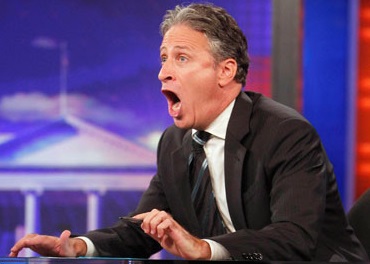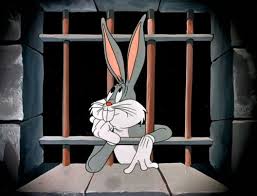Posted on February
17, 2015
Who Killed Comedy?
Liberals, and not by accident
by
Daniel
Clark
Since Jon Stewart announced that he will be ending The Daily Show, which has run on Comedy
Central for 16 years, even non-liberals have expressed a certain amount of admiration
for him, and not completely without reason.
Unlike the mainstream late-night hosts, Stewart is forthright about the
fact that he’s pitching his liberal ideology, and when he interviews
conservatives, he’s a lot more polite to them than David Letterman has ever
been. But is he funny?
 No. Not even close. Just try watching and reading the
“highlights” in some of the posterior-puckering retrospectives being done about
his show. You’ll find no jokes, and very
few witty remarks. Even with a team of
writers for his scripted news update segments, the best response he can usually
come up with is an unfunny expression of incredulity, followed by an F-bomb or
some other outburst of mindless invective.
No. Not even close. Just try watching and reading the
“highlights” in some of the posterior-puckering retrospectives being done about
his show. You’ll find no jokes, and very
few witty remarks. Even with a team of
writers for his scripted news update segments, the best response he can usually
come up with is an unfunny expression of incredulity, followed by an F-bomb or
some other outburst of mindless invective.
That’s what now passes for comedy, in this humorless,
post-comedic world we live in. The
liberal pop media have created a new paradigm, by which “comedy” is defined as
whatever makes liberals feel satisfied with themselves and their beliefs,
whether it’s actually funny or not.
That’s why the most common reaction to left-wing comedians is applause,
and not laughter.
This is not a new phenomenon, as anyone knows who’s
ever had the misfortune of seeing a video of Lenny Bruce doing stand-up. Bruce was lionized by Sixties liberals for his
defiance of obscenity laws, and for his role in transforming comedy clubs into
yet another forum for left-wing political expression. His jokes, and his delivery of them, were
about as funny as a case of prickly heat.
The smattering of people who actually paid to see him would seldom
laugh, but would occasionally voice their approval of his point of view.
After decades of liberal dominance of the
entertainment industry, the unfunny-fication of
comedy is almost complete. Next time you
peruse the comedy section of a video store, see how many funny movies you can
find, without going at least as far back in time as the Eighties. Not only are very few of them made anymore,
but there are now whole categories of “comedies” that don’t even feign much of
an attempt at humor.
There was a time when movies that called themselves
“romantic comedies” were actually funny, or at least tried to be. Now, they’re little more than celebrations of
the feminization of men. “Dark
comedies,” being depraved exercises in morbidity, often characterized by
graphic violence, are anti-humorous by definition.
Last summer, critics hailed a movie called Obvious Child as the first-ever
“abortion comedy” – a term they coined in apparent hope of creating a new
genre. The story was about a woman who
had become pregnant through a casual encounter, and was so unashamed of her
decision to abort that she freely discussed it with everyone except the child’s
father. The film’s release was greeted
by little more than a few chirping crickets, and even they are still waiting
for the punch line.
 Of
course, politics and humor are not mutually exclusive categories. Liberal entertainers ought to be able to
promote their political beliefs within a comedic context, but by now they’ve
rendered themselves incapable of it, and not just because they’re naturally unfunny
people, which they are.
Of
course, politics and humor are not mutually exclusive categories. Liberal entertainers ought to be able to
promote their political beliefs within a comedic context, but by now they’ve
rendered themselves incapable of it, and not just because they’re naturally unfunny
people, which they are.
Another reason is that successful comedy is supposed
to contain an element of truth, whereas liberals reject the very concept of
truth in favor of “competing narratives.”
For example, the left-wing narrative about Hurricane Katrina is that
George W. Bush is a racist. When a
liberal makes a “joke” to that effect, you don’t have to be a supporter of
Bush’s in order to not find it funny. The
total absence of factual support for its conclusion will be enough to mute your
reaction. Other liberals won’t actually
laugh either, but will instead react with hoots and whistles, in order to make it
known that they approve of the narrative.
The other major impediment to liberal political humor
is that liberals are the inventors of political correctness. When they hear that people are amused by
something, their immediate reaction is to put a stop to it. Once they’ve screened their own material to
make sure they’re not offending feminists, ethnic grievance groups,
homosexuals, transvestites, Muslims, atheists, Satanists, people with webbed
toes, people with peanut allergies, and people who take offense on behalf of
animals and plants, that doesn’t leave a lot of opportunities for humor.
Liberals have seen to it that vulgarity runs rampant
on television, and yet movies from the pre-PC era are more heavily edited than
ever. When the NBC Sports Network shows
the original version of The Longest Yard,
it omits all scenes featuring an inmate named Indian, just to avoid any mention
of the word. That station’s edited
version of Slap Shot leaves most of
its raunchiness intact, but cuts out all of Killer Carlson’s references to the
Swami Baha. If you want to see Blazing Saddles in anywhere near its
entirety, you have to buy it on disc, because AMC and most other cable networks
blank out every potentially offensive utterance from the entire script. We’re not far from the point where words like
“Oriental”, “midget” and “crazy” are placed on the forbidden list as well. Heck, you can’t even say “comedienne”
anymore.
In a way, it’s a brilliant strategy. Liberal comedy no longer has to compete in an
open marketplace, just as long as liberals have the power to suppress the
competition by inhibiting funniness altogether.
That way, nobody’s around to impede them from lowering the bar.
Johnny Carson used to be paid the dubious compliment
that he was better than his material.
That’s not possible in Stewart’s case, because now, material is
everything, and yet it is nothing. Tell
a joke that defies the laws of political correctness, and you’re just a
hater. Shout F-off into the camera at
the enemies of the Left, like Stewart does, and you’re the preeminent comic
genius of the 21st Century.
And you’ve got the liberal applause to prove it.
The Shinbone: The
Frontier of the Free Press